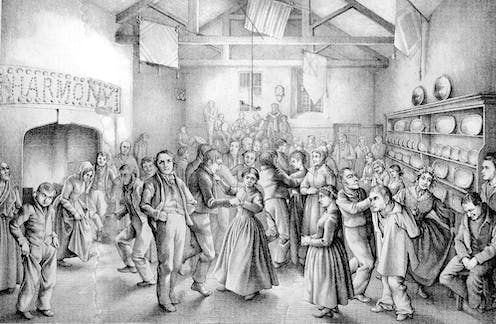
Music has a powerful effect on the listener. It is linked to better mental health, and it has been shown to alleviate loneliness, pain, anxiety and depression.
For this reason, it is increasingly being prescribed by doctors as a form of medicine. This practice – where patients are referred to various activities such as running groups, art classes and choirs – is known as social prescribing.
Music-based activities may be prescribed to help support patients’ mental health, combat isolation, encourage physical activity, and keep an active brain.
While social prescribing is a relatively new practice, the use of music as a therapeutic tool is not. The first widespread use of music as a therapeutic tool can be traced back to the 19th century, where it was used in Victorian asylums to support patients’ treatment.
Table of Contents
Music in asylums
Victorian asylums are usually associated with poor sanitation, overcrowding, danger and patients held against their will. Indeed, the Victorians had little understanding of mental illness and the brain, which meant many treatments considered barbaric today were used on patients – including bleeding, leeching, shaving the head and bathing in ice.
From the end of the 18th century, however, practitioners moved away from the worst types of physical restraint. A new practice emerged, known as “moral management”, which placed a focus on using employment, diet, surroundings and recreational activities as forms of therapy.
When state-run asylums were first introduced in Britain in the early 19th century, music soon became included as a form of moral management to distract patients outside of working hours and keep them occupied. Both music and dance were efficient ways of entertaining large numbers of patients.
By the middle of the 19th century, almost all the larger asylums in the UK had their own band and would often organise dances, attended by over a hundred patients. Asylums also hosted concerts by travelling performers, from comic sketches to solo singers and amateur choirs. Dances and concerts were usually the only opportunities for patients to meet in a large group, providing important social interaction.

Wellcome Collection
Among the smaller asylums, chiefly catering for wealthier patients, patients had more options to create music as part of their treatment. They would often bring instruments with them. And small concerts put on by patients and staff were common.
The benefits of music
Much of the therapeutic value of music was attached to its social function. Accounts suggest that patients benefited from the anticipation of these social engagements and that events were used to reward good behaviour. Music was also used to break up the monotony of asylum life.
For example, at one private asylum, Dr Alfred Wood, wrote:
These entertainments involved a great amount of trouble in their preparation and arrangement and, I may add, considerable expense; but they are invaluable as a relief to the monotony of life in an Asylum. The pleasure they afford as well in anticipation as in reality, is ample to compensate for the efforts made to present them …
Dances, in particular, offered exercise and enjoyment, and even patients who were unable to dance enjoyed the music and watching fellow patients.
Musical events also carried strict expectations of behaviour. Patients needed a good deal of self-control to participate and behave appropriately. It was this process of conforming to expectations that formed an important part of rehabilitation. William A.F. Browne, one of the most noteworthy asylum doctors of the era, wrote in 1841 about the self-control needed before, during and after amusements.
Others suggested that music would help remind patients of happier days and give them hope and pleasure during their treatment. Browne also cited the “powers of music to soothe, enliven, rouse, or melt”. He suggested that even difficult patients may benefit from music, writing: “There is or may be a hidden life within him which may be reached by harmony.”
The writer James Webster recorded in 1842 that: “In many, the effect produced by the music upon their countenances and behaviour was often quite apparent.” Records include many stories of patients seemingly cured by music.
Webster cites the example of a young girl, previously “morose” and “stupefied”, who under the influence of music, seemed “pleased” and “cheerful” – appearing “altogether a changed creature”. Browne also wrote in one of his books of the miraculous effect music had on one patient who awoke, cured, the morning after listening to a performance of Scottish traditional melodies.
Music as treatment
In the 1890s, many doctors carried out experiments on the relationship between music and mental illness. Herbert Hayes Newington, medical superintendent of one of the era’s most prestigious asylums, used music to diagnose patients and help develop theories on how the brain works. Reverend Frederick Kill Harford, who campaigned to provide music in public hospitals during the early 1890s, believed music could treat depression, alleviate physical pain and help with sleep.
Although music remained in asylums as a form of therapy, interest in it as a large-scale treatment waned as innovations such as electroconvulsive therapy emerged in the 20th century.
For patients in Victorian asylums, therefore, music was an important part of mental health treatment – not only providing an opportunity for creative engagement but also fulfilling a range of social, emotional and intellectual needs. Given what we know now about the benefit of music on mental health, it’s no wonder doctors are making use of it again.
![]()
Rosemary Golding has received funding from The Wellcome Trust and the Arts and Humanities Research Council.





























